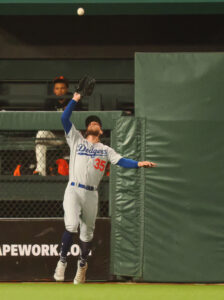The Dodgers will not tender a contract to Cody Bellinger for his final year of arbitration eligibility, reports Ken Rosenthal of the Athletic (Twitter link). MLBTR contributor Matt Swartz had projected the 2019 NL MVP for a salary around $18.1MM. Bellinger will be a free agent once the team officially announces the decision.
It’s not a surprising move at this point, but it’s one nobody would’ve foreseen when Bellinger was collecting his MVP trophy three years ago. He blasted 47 home runs that season and posted an overall .305/.406/.629 line across 661 plate appearances. The left-handed hitter looked to have cemented himself as one of the sport’s preeminent sluggers, and he carried a career .278/.368/.559 mark in over 1800 plate appearances heading into 2020. At age 24, Bellinger seemed a budding superstar.
Unfortunately, things have gone south over the past few seasons. He stumbled a bit during the abbreviated 2020 campaign, putting up a .239/.333/.455 line in 56 games. That was still above-average production but a notable step back from the numbers of his first few seasons. A putrid .245 batting average on balls in play seemed to be a major cause of that, and one could certainly point to the anomalous circumstances that year in anticipating a bounceback.
That’s not how things have played out, seemingly in part due to an ill-advised celebration that postseason. Bellinger dislocated his right shoulder celebrating a crucial home run in Game 7 of the 2020 NLCS. While he played out the postseason, he underwent surgery in mid-November. Bellinger was healthy enough to open the 2021 campaign on the roster, but he battled a series of unrelated leg and rib issues. In between, his slash line plummeted to a meager .165/.240/.302 in 95 games.

L.A. brought him back last winter, avoiding arbitration on a $17MM salary. Their hoped-for bounceback season didn’t really materialize, though. Bellinger’s 2022 numbers were improved from the prior year but nowhere near those of previous seasons. In 550 trips to the plate, he put up a .210/.265/.389 mark. That brings him to exactly 900 plate appearances over the past two years, in which he’s hit .193/.256/.355. His on-base percentage is lowest among the 151 hitters with 900+ trips to the dish, while his batting average bests only that of Joey Gallo. He’s sixth from the bottom in slugging.
Bellinger’s batted ball metrics and power output have taken a step back, which could indicate he’s never quite regained the explosiveness in his swing after the shoulder surgery. Yet he’s also seen a marked uptick in strikeouts, fanning 27.1% of the time after cutting his strikeout rate below 18% in 2019-20. His walk percentage fell to a below-average 7.7%, and manager Dave Roberts has increasingly dropped him further in the batting order.
With two full seasons of huge offensive struggles under his belt, the Dodgers have elected to move on rather than pay the two-time All-Star in the neighborhood of $18MM. That always looked to be more than even the high-spending franchise would be willing to pay, and it stands to reason no other club was willing to offer that kind of salary either. The Dodgers have presumably spent the past few weeks gauging the trade market for Bellinger, and that he’ll be cut loose for no return indicates there wasn’t much interest at that price point.
That said, there’s no question he’ll be of interest to teams as a bounceback target at a lower cost. Bellinger, to his credit, hasn’t allowed his offensive struggles to affect his work in the field. He’s an elite runner who has moved full-time to center field after coming up as a first baseman and corner outfielder. Defensive Runs Saved has rated him as a roughly average center fielder the last two years, but Ultimate Zone Rating and Statcast have pegged him above par. Statcast has been most bullish, rating him as seven runs above average in just under 1900 innings of center field work since the start of the 2021 campaign.
Slightly above-average center field defense and plus baserunning gives Bellinger a decent floor even if he’s not hitting well, although he’s obviously quite a bit more of an upside play than a traditional glove-only outfielder. He’ll look for a complete reset offensively but heading into his age-27 campaign, he could certainly still rediscover some of his old form at the plate.
Non-tendered players aren’t subject to waivers, so Bellinger will be a free agent. He and his representatives at the Boras Corporation will have the opportunity to gauge interest from other teams, and they’ll benefit from a lack of supply in center field. Excepting Aaron Judge, former Met Brandon Nimmo is the top center fielder available in free agency. Bellinger arguably becomes the next-best option in a class that also includes Kevin Kiermaier, Adam Duvall and Jackie Bradley Jr.
The Mets, Blue Jays, Marlins, Rangers, Rays, Rockies, Astros, Padres and Giants (a team run by former L.A. executive Farhan Zaidi) could all look externally for center help. They’re speculative fits for Bellinger, and the Dodgers themselves could remain in contact about a reunion at a lower price point.
Los Angeles could give Mookie Betts, Chris Taylor or Trayce Thompson increased center field run, but it stands to reason they’ll also scour the market for help outside the organization. Bob Nightengale of USA Today reports (on Twitter) they’re taking a look at Kiermaier as part of that search.
Subtracting Bellinger’s arbitration projection leaves L.A. with around $152MM in projected 2023 payroll, per Roster Resource, pending additional arbitration decisions. They’re estimated around $169MM in luxury tax obligations, leaving them well shy of next year’s $233MM base tax threshold. That doesn’t include an approximate $20MM salary for Clayton Kershaw, who’s reportedly nearing a deal to re-sign. Still, the Dodgers should have plenty of financial breathing room to address shortstop, center field, third base and rotation depth that look like the team’s biggest question marks early in the offseason.
Image courtesy of USA Today Sports.
